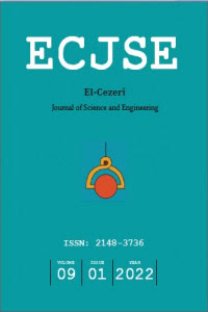Sac Malzeme Yüzey Pürüzlülüğünün Fiber-Metal Tabakalı Kompozitlerin Mekanik Özelliklerine Olan Etkisi
alüminyum, cam elyaf, fiber-metal tabakalı kompozit, mekanik özellik, yüzey pürüzlülüğü
The Effect of Sheet Material Surface Roughness on Mechanical Properties of Fiber-Metal Laminated Composites
Aluminum, fiber-metal laminated composites, glass fiber, mechanical properties, surface roughness,
___
- [1]. Yanen, C., Solmaz, M.Y. Tabakalı hibrit kompozitlerin bireysel zırh malzemesi olarak üretimi ve balistik performanslarının incelenmesi. El-Cezerî Fen ve Mühendislik Dergisi, 2016, 3(2): 351–362.
- [2]. İlhan, R., Feyzullahoğlu, E. Cam elyaf takviyeli polyester (ctp) kompozit malzemelerde kullanılan doğal elyaflar ve dolgu maddeleri. El-Cezerî Fen ve Mühendislik Dergisi, 2019, 6(2): 355–381.
- [3]. Çakır, M., Berberoğlu, B. E-cam elyaf takviyeli epoksi matrisli kompozit malzemelerin elyaf oranındaki artış ile mekanik özelliklerindeki değişimlerin incelenmesi. El-Cezerî Fen ve Mühendislik Dergisi, 2018, 5(3): 734–740.
- [4]. Cortes, P., Cantwell, W.J. The prediction of tensile failure in titanium-based thermoplastic fibre–metal laminates. Composite Science and Technology, 2006, 66: 2306–2316.
- [5]. Asundi, A., Choi, A.Y.N. Fiber metal laminates: an advanced material for future aircraft. Journal of Materials Processing Technology, 1997, 63: 384–394.
- [6]. Villanueva, G.R., Cantwell, W.J. The high velocity impact response of composite and FML-reinforced sandwich structures. Composite Science and Technology, 2004, 64: 35–54.
- [7]. Vogelesang, L.B., Vlot, A. Development of fibre metal laminates for advanced. Journal of Materials Processing Technology, 2000, 103: 1–5.
- [8]. Pekbey, Y., Aslantaş, K., Yumak, N. The effect of hybridization on the ballistic ımpact behavior of nanostructured hybrid composite plates. El-Cezerî Journal of Science and Engineering, 2020, 7(1): 124-134.
- [9]. Alderliesten, R.C., Benedictus, R. Fiber/metal composite technology for future primary aircraft structures. In: 48th Aiaa/Asme/Asce/Ahs/Asc structures, structural dynamics, and materials conference 15th; April 23–26, 2007, Honolulu, Hawaii, 1–12
- [10]. Chang, P.Y., Yeh, P.C., Yang, J.M. Fatigue crack initiation in hybrid boron/glass/ aluminum fiber metal laminates. Materials Science and Engineering: A, 2008, 496: 273–280.
- [11]. Sinmazçelik, T., Avcu, E., Bora, M.Ö., Çoban, O. A review: Fibre metal laminates, background, bonding types and applied test methods, Materials and Design, 2011, 32: 3671–3685.
- [12]. Jakubczak, P., Bienias, J., Surowska, B. Interlaminar shear strength of fibre metal laminates after thermal cycles, Composite Structures, 2018, 206: 876–887.
- [13]. Da Costa, A.A., Da Silva, D.F.N.R., Travessa, D.N., Botelho, E.C. The effect of thermal cycles on the mechanical properties of fiber–metal laminates. Material and Design, 2012, 42: 434–440.
- [14]. Rosselli, F., Santare, M.H. Comparison of the short beam shear (SBS) and interlaminar shear device (ISD) tests. Composites Part A: Applied Science and Manufacturing, 1997, 28(6): 587–594.
- [15]. Bosbach, B., Gerngross, M.B., Heyden, E., Gerngross, M.D., Carstensen, J., Adelung, R., Fiedler, B. Reaching maximum inter-laminar properties in GFRP/nanoscale sculptured aluminium ply laminates, Composites Science and Technology, 2018, 167: 32–41.
- [16]. Dadej, K., Bienias, J., Surowska B. Residual fatigue life of carbon fibre aluminium laminates, International Journal of Fatigue, 2017, 100: 94–104.
- [17]. Fan, Z., Santare, M.H., Advani, S.G. Interlaminar shear strength of glass fiber reinforced epoxy composites enhanced with multi-walled carbon nanotubes, Composites: Part A, 2008, 39: 540–554.
- [18]. Park, S.Y., Choi, W.J., Choi, H.S., Kwon, H., Kim, S.H. Recent trends in surface treatment technologies for airframe adhesive bonding processing: a review (1995–2008). The Journal of Adhesion, 2010, 86: 192–221.
- [19]. Harris, A.F., Beevers, A. The effects of grit-blasting on surface properties for adhesion. International Journal of Adhesion and Adhesives, 1999, 19: 445–452.
- [20]. Critchlow, G.W., Yendall, K.A., Bahrani, D., Quinn, A., Andrews, F. Strategies for the replacement of chromic acid anodising for the structural bonding of aluminium alloys. International Journal of Adhesion and Adhesives, 2006, 26: 419–453.
- [21]. Kinloch, A.J. Adhesion and adhesives, Chapman & Hall, London, 1987.
- [22]. Baldan, A. Review adhesively-bonded joints and repairs in metallic alloys, polymers and composite materials: adhesives, adhesion theories and surface pretreatment, Journal of Materials Science, 2004, 39: 1-49.
- [23]. Chawla, K.K. Composite materials: science and enginnering Springer Science+Business Media, New York, 2012.
- [24]. Kim, J.K., Mai, Y.W. Engineered interfaces in fiber reinforced composites Elsevier Science, Oxford, 1998.
- [25]. Flinn, R.A., Trojan, P.K. Engineering materials and their applications Jaico Publishing House, 2006.
- [26]. Su, Y., De Rooij, M., Grouve, W., Akkerman, R. The effect of titanium surface treatment on the interfacial strength of titanium – Thermoplastic composite joints, International Journal of Adhesion and Adhesives, 2017, 72: 98-108.
- [27]. https://www.pinarmetal.com/aluminyum.html (Erişim Tarihi:25-02-2021)
- [28]. https://www.kompozit.net/mgs-laminasyon-epoksi-seti-l160-h160-set-a-b (Erişim Tarihi:12-01-2021)
- [29]. https://www.kompozit.net/cam-fiber-kumas-300-gr-m2-twill-1m2 (Erişim Tarihi:12-01-2021)
- ISSN: 2148-3736
- Yayın Aralığı: Yılda 3 Sayı
- Başlangıç: 2013
- Yayıncı: Tüm Bilim İnsanları ve Akademisyenler Derneği
Borlanmış Donatının Mikroyapısal Karakterizasyonu ve Korozyon Direnci
Tayfun UYGUNOĞLU, İbrahim GÜNEŞ, Atila Gürhan ÇELİK, Emriye ÇINAR
Gelişmiş Bir Güneş Kolektörünün Tasarımı Ve Analizi
Ömer ERSÖZ, Yunus ÇERÇİ, Orçun EKİN
Tuğba Özge ONUR, Gülhan USTABAS KAYA
Makine Öğrenme Metotları Kullanılarak KSA Ddos Saldırıları Tespiti
Pelin KOPARIR, Rebaz OMER, Mustafa KARATEPE, Lana AHMED
Siyah Karbon Stabilizasyonlu Zeminin Rijit Kaplama Kalınlığı ve Maliyetine Etkileri
Tacettin GEÇKİL, Talha SARICI, Bahadır KARABAŞ
Kiralama sektörünün gelişimine yönelik tasarlanan bir matematiksel model
Naime DEMİRTAŞ, Orhan DALKILIÇ
Alaattin KAÇAL, Ferhat YILDIRIM, Murat KOYUNBAKAN
Statik ve Dinamik Yükleme Koşullarına Maruz Kazıklarla Güçlendirilen Bir Şevin Stabilite Analizleri
